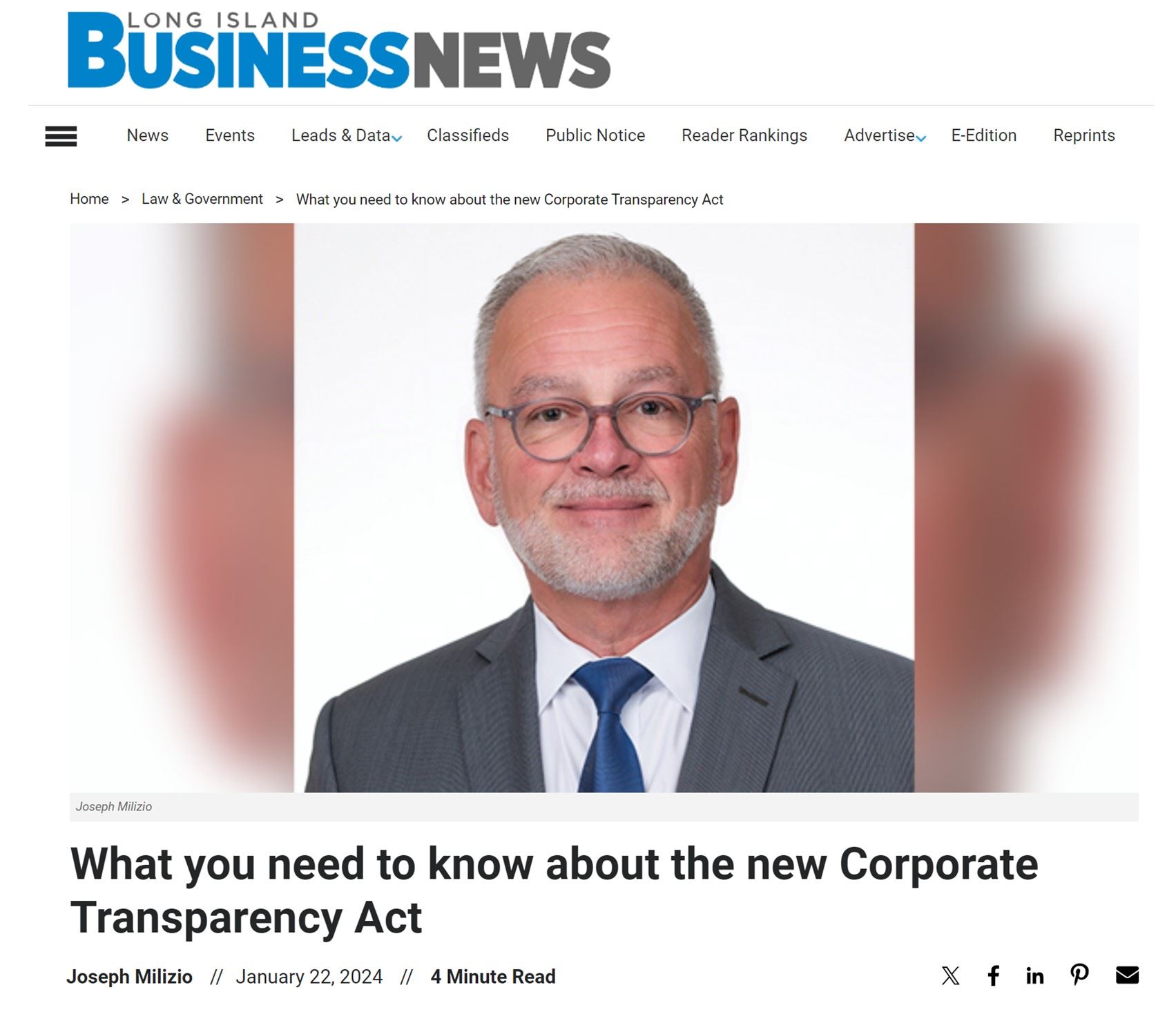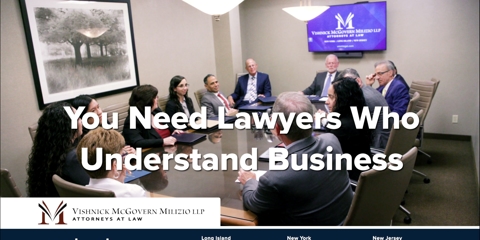VMM managing partner Joseph Milizio, head of the firm's Business and Transactional Law division, was invited by Long Island Business News (LIBN) to explain the new Corporate Transparency Act, and how businessowners and executives can ensure they're in compliance.
Mr. Milizio was asked to expand upon his "predictions for the year ahead" in last week's LIBN edition.
The article appeared yesterday in print and online. It can be read here and below.

If you own or oversee a corporation, LLC, or other registered business, you must file an ownership report with the Financial Crimes Enforcement Network beginning Jan. 1, 2024. Failure to comply may result in fines up to $10,000 and criminal prosecution.
The new Corporate Transparency Act requires most business entities, especially small ones, to file a beneficial ownership information report with the Department of the Treasury’s Financial Crimes Enforcement Network. The report must identify the business’ “beneficial owners,” meaning individuals or entities that own 25% or greater interest in the business, or otherwise exercise substantial control over it, directly or indirectly.
The CTA was enacted by Congress in January 2021, as part of the Anti-Money Laundering Act of 2020. It’s designed to combat various forms of illicit financial activity, including terrorism, by enabling law enforcement agencies to uncover the individuals behind limited liability companies, corporations and other entities. While it authorizes FinCEN to share ownership information with other government agencies, and under certain circumstances with financial institutions, the database isn’t public.
Who is required to file the report?
Both domestic and foreign companies operating in the U.S. are required to file the report. This includes corporations, LLCs and other “similar entities” registered with the secretary of state or similar office.
The CTA doesn’t define “similar entity,” but FinCEN guidance suggests this includes limited liability partnerships, business trusts and most limited partnerships.
Some LLCs and trusts formed for estate planning purposes are also required to file.
Who isn’t required to file the report?
Twenty-three types of entities are exempt from filing the report. These include companies already subject to federal or state regulations that require beneficial ownership information, such as banks, insurance companies, accounting firms, publicly traded companies, and nonprofits and other tax-exempt entities.
Also included are businesses with more than 20 full-time employees that operate from a physical office in the U.S. and have a gross revenue of over $5 million. Subsidiaries are also exempt.
As a result, the requirement to file the report is mostly imposed on small businesses.
Estate plan trusts & LLCs
LLCs and trusts formed for estate planning purposes, including those holding title to real property, are generally required to file the report.
To be exempt, all six of the following requirements must be met:
- The entity has been in existence since at least Jan. 1, 2020.
- The entity isn’t engaged in active business.
- The entity isn’t owned by a foreign person, whether directly or indirectly, wholly or partially.
- The entity hasn’t experienced any change in ownership in the preceding 12-month period.
- The entity hasn’t sent or received an amount greater than $1,000, either directly or through any financial account.
- The entity doesn’t otherwise hold any kind of asset, including any ownership interest in any corporation, limited liability company, or other similar entity.
When are businesses required to report?
The CTA is effective Jan. 1, 2024. Reporting companies created beginning that date are required to file the report within 90 days of formation, creation or registration.
Companies pre-existing that date are required to file the report no later than Jan. 1, 2025.
What’s needed in the report?
The report requires information about the company and its owners. For the company:
- Company name and any trade or DBA (doing business as) names
- Physical address of its principal place of business
- Its jurisdiction of formation
- Its IRS taxpayer identification number.
Foreign companies have additional reporting requirements.
For the company’s beneficial owners:
- Full legal name
- Date of birth
- Current address
- A unique identifying number from either a driver’s license, state ID, or unexpired passport and a copy of that document
To remind, “beneficial owners” include individuals or entities with at least 25% of ownership interests in the business, as well as individuals or entities who directly or indirectly exercises substantial control over it. This may be senior officers, individuals who can appoint and remove senior officers and anyone who determines or influences important decisions made by the company.
Those not considered beneficial owners are:
- Persons whose control over the company derives solely from their employment (e.g., managers)
- Persons whose only interest in the company is through right of inheritance
- Minors (parents or guardians are still required to report)
- Intermediaries or agents on behalf of others
- Creditors (unless they qualify as a beneficial owner through substantial control or equity ownership)
The report must also contain the information of the person who filed or oversaw the filing of the document that created the company.
What happens if the report is incorrect or needs updating?
If the information for the company or the beneficiary owners changes or was reported incorrectly, an updated report must be filed within 30 days of the change or the company becoming aware of the inaccuracy.
Willful failure to provide accurate and timely information may result in both civil and criminal penalties, including a maximum civil penalty of $500 per day (up to $10,000) and imprisonment for up to two years.
Other considerations
For some businesses, the information required is straightforward. For others, with more complex ownership or beneficiary structures, reporting requires greater care. Especially in cases involving business reorganization, mergers and acquisitions, exit and succession planning, or related estate planning, compiling a comprehensive and accurate report requires greater diligence.
Reporting businesses are urged to start the process as soon as possible, and have their report compiled or reviewed by a qualified attorney.
Joseph Milizio is the managing partner of Vishnick McGovern Milizio LLP, where he heads the business & transactional division. He can be reached at jmilizio@vmmlegal.com.



